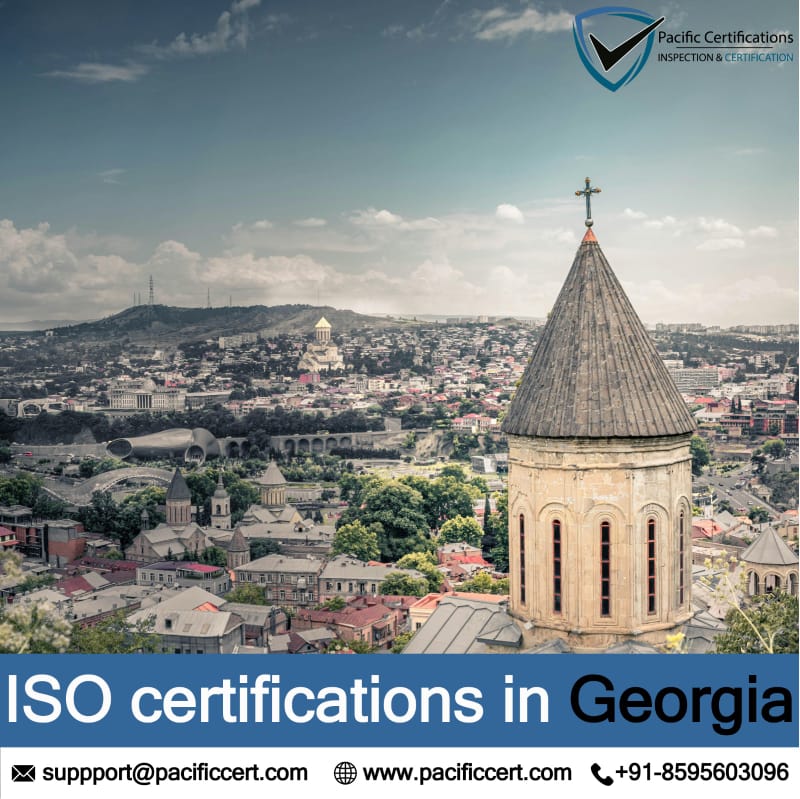ISO Certifications in Georgia, Popular Standards, Requirements and Benefits

ISO certifications play a crucial role in improving business efficiency and credibility globally, including in Georgia. These certifications are standardized across various industries and disciplines and can significantly benefit businesses by ensuring quality, safety, environmental friendliness, and information security. Here's an overview of key ISO certifications relevant in Georgia :
Popular ISO Certifications in Georgia
ISO 9001: Quality Management Systems
This standard applies to any organization, regardless of size or industry. It focuses on meeting customer expectations and delivering consistent performance.
ISO 14001: Environmental Management Systems
Suitable for any organization that wants to improve environmental performance, irrespective of its activity or sector.
ISO 27001: Information Security Management Systems
Essential for organizations that handle significant amounts of data or are involved in IT and data management sectors.
ISO 45001: Occupational Health and Safety Management Systems
Relevant for organizations of all sizes wishing to establish, implement, and maintain an occupational health and safety (OH&S) management system to improve workplace safety.
Click here to find out more applicable standards to your industry
How we at Pacific Certifications can help?
Audit and Certification Process
Gap Analysis: we can start with a thorough gap analysis to identify the current status of your organization compared to the requirements of the ISO standards you are interested in. This will help in understanding the areas that need improvement to meet the standards.
Training and Support: Pacific Certifications provides comprehensive training to your staff to ensure they understand the ISO standards' requirements and how to implement them. This training can be customized to the specific needs of your organization and its operational context.
Documentation Assistance: we can assist in documenting processes, procedures, and controls according to the standards' guidelines.
Pre-Audit Assessment: Before the actual certification audit, a pre-audit assessment can be conducted by us to ensure that all standards are properly implemented and ready for the external audit.
Certification Audit: This audit assesses the effectiveness of the management system and its compliance with the ISO standard. If the audit is successful, the certification is granted.
Continuous Improvement and Surveillance Audits: After certification, we provide ongoing support and regular surveillance audits to ensure that your organization remains in compliance with the ISO standards and continues to improve.
For businesses in Georgia looking to improve their management systems, adhere to international standards, and gain a competitive edge.
Requirements of ISO Certifications in Georgia
The primary objective of ISO certifications is to standardize the quality, safety, environmental impact, and efficiency of products and services across industries. Below are some common ISO certifications and their general requirements that apply in Georgia:
ISO 9001: Quality Management Systems requirements:
Leadership and Commitment: Senior management must demonstrate leadership and commitment to the QMS.
Customer Focus: Organizations must understand and meet customer requirements, enhancing customer satisfaction.
Quality Policy: Development, implementation, and maintenance of a quality policy that is aligned with organizational goals.
Planning: Planning for the QMS must address risks, opportunities, and quality objectives.
Support: Adequate resources, including human resources, infrastructure, and an environment suitable for the operation of processes.
Operation: Effective planning, implementation, and control of processes needed to meet quality requirements.
Performance Evaluation: Monitoring, measurement, analysis, and evaluation of the quality performance.
Improvement: Ongoing improvements to the system based on performance evaluation.
ISO 14001: Environmental Management Systems requirements:
Environmental Policy: Organizations must establish an environmental policy that is appropriate to the purpose of the organization.
Planning: Identification of environmental aspects and associated impacts, legal requirements, and other obligations.
Resources: Allocation of resources to maintain, monitor, and continually improve the EMS.
Competence and Awareness: Employees must be competent and aware of their environmental responsibilities.
Operational Control: Processes associated with significant environmental aspects must be controlled.
Emergency Preparedness and Response: Procedures to respond to potential environmental emergencies.
Performance Evaluation and Improvement: Regular environmental performance evaluation and actions to improve it based on the evaluations.
ISO 27001: Information Security Management Systems requirements:
Information Security Policy: Policies for information security management tailored to the needs of the organization.
Risk Management: Identification, analysis, and treatment of information security risks.
Security Controls: Implementation of appropriate security controls and regular review of their effectiveness.
Employee Training and Awareness: Ongoing training and awareness programs for all employees regarding their information security responsibilities.
Incident Management: Effective information security incident management procedures.
Continuous Improvement: The management system must feature a continual improvement process.
ISO 45001: Occupational Health and Safety Management Systems requirements:
OH&S Policy: Development of an occupational health and safety policy.
Hazard Identification and Risk Assessment: Identification and assessment of workplace hazards and risks.
Legal and Other Requirements: Compliance with legal and other requirements related to health and safety.
Objectives and Planning to Achieve Them: Setting and planning to achieve occupational health and safety objectives.
Support and Operation: Supporting services, emergency preparedness, and response.
Performance Evaluation and Improvement: Regular monitoring and continual improvement of OH&S performance.
We can guide companies through each step of the process, from initial gap analysis to certification and continual improvement contact us today!
Benefits of ISO Certifications in Georgia
ISO certifications bring a multitude of benefits to businesses in Georgia. These benefits span across various aspects of business operations, including enhanced operational efficiency, improved product and service quality, better environmental management, and strengthened information security.
Here’s a breakdown of the specific advantages that Georgian businesses can gain from obtaining ISO certifications:
Enhanced Credibility and Market Access
- International Recognition: ISO certifications are recognized globally, which can significantly boost a company's credibility with international partners and customers.
- Competitive Advantage: In competitive bid situations, having ISO certifications can distinguish a company from competitors who do not have similar credentials.
- Customer Trust: Certifications signal to customers that a company is committed to quality standards and continuous improvement, enhancing trust and customer retention.
Improved Quality and Efficiency
- Standardization of Processes: ISO standards help organizations standardize their processes according to international best practices, leading to increased efficiency.
- Quality Improvement: Continuous improvement is a key component of ISO frameworks, which helps companies enhance the quality of their products or services over time.
- Reduction of Waste: By optimizing operations, businesses can reduce waste and lower costs, improving overall profitability.
Compliance and Risk Management
- Regulatory Compliance: ISO certifications often help organizations comply with legal and regulatory requirements, reducing the risk of non-compliance penalties.
- Risk Management: ISO standards require that businesses identify and manage risks systematically, which helps prevent issues before they arise and reduce the impact of unforeseen events.
Enhanced Employee Engagement
- Clear Roles and Responsibilities: ISO standards help clarify roles and responsibilities within an organization, which can improve employee morale and job satisfaction.
- Safer Workplaces: Standards like ISO 45001 focus on improving employee safety, reducing workplace accidents and creating a healthier work environment.
- Professional Development: Training and development that come with ISO implementation can enhance employee skills and engagement.
Environmental Impact
- Environmental Performance: ISO 14001 helps companies improve their environmental performance by managing their environmental responsibilities in a systematic manner.
- Sustainability: This certification supports long-term ecological balance, which can enhance a company’s image and appeal to environmentally conscious consumers and partners.
Information Security
- Data Protection: ISO 27001 helps protect sensitive company and customer information, which is crucial in the digital age.
- Cybersecurity Enhancement: It provides a framework for managing and enhancing cybersecurity measures, crucial for protecting against data breaches and cyber threats.
Overall, ISO certifications can serve as a strategic tool for Georgian businesses looking to improve their internal operations and grow their market presence both locally and internationally.
We at Pacific Certifications can provide comprehensive support to businesses in Georgia aiming to obtain ISO certifications.
Which Industries need ISO Certifications in Georgia?
In Georgia ISO Certifications are highly beneficial and effectively essential for businesses looking to improve their operations, comply with international standards, enhance their competitiveness, and gain access to global markets. Below are some key industries in Georgia where ISO certifications are particularly relevant:
Manufacturing
QMS Ensures quality management in the production processes, leading to higher quality products.
Food and Beverage
FSMS: Pertains to food safety management, crucial for ensuring the safety of food products.
QMS Can also apply to improve overall quality management systems in operations.
Information Technology and Cybersecurity
ISMS Essential for protecting information and managing data security systems in IT companies.
ITMS Relevant for IT service management, ensuring service processes meet international standards.
Healthcare
MDQMS Specifically designed for medical device manufacturers, focusing on safety and quality.
QMS Helps in enhancing overall management and operational procedures in healthcare facilities.
Construction and Engineering
LQMS: Ensures quality management in construction projects, from design to execution.
OHSAS Critical for managing occupational health and safety risks in construction sites.
Tourism and Hospitality
QMS can help hotels, resorts, and tour operators manage their operations more efficiently and enhance customer satisfaction.
EMS: Helps businesses in this sector manage their environmental footprint, which is particularly important given the ecological sensitivity of many tourist destinations.
Banking and Financial Services
ISMS: Especially relevant for protecting financial information and managing risks associated with information security.
BCMS: Business continuity management standard, crucial for ensuring operations can continue during and after a disruptive event.
Education
EOMS: Educational organizations management systems, designed to ensure educational institutions can enhance their learning environments.
Energy and Utilities
EMS: Focuses on energy management, helping companies increase energy efficiency and reduce environmental impact.
EMS: Also relevant for managing the environmental impact of operations in this sector.
Conclusion
ISO certifications offer improved efficiency, risk management, and marketability make them highly advantageous for a broad spectrum of sectors in Georgia.
Pacific Certifications is accredited by ABIS, in case you need support with ISO certification for your business in Georgia, please contact us at [email protected] or +91-8595603096.
Ready to get ISO certified?
Contact Pacific Certifications to begin your certification journey today!
Suggested Certifications –
Read more: Pacific Blogs

